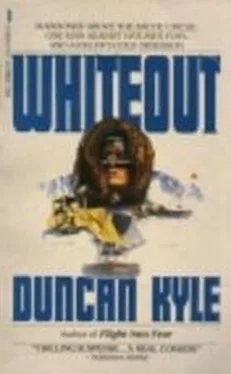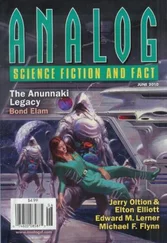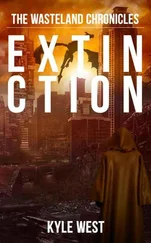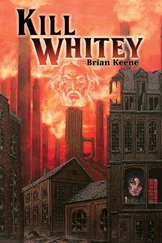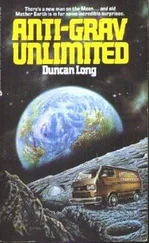Duncan Kyle - Whiteout!
Здесь есть возможность читать онлайн «Duncan Kyle - Whiteout!» весь текст электронной книги совершенно бесплатно (целиком полную версию без сокращений). В некоторых случаях можно слушать аудио, скачать через торрент в формате fb2 и присутствует краткое содержание. Год выпуска: 1976, ISBN: 1976, Жанр: Старинная литература, на английском языке. Описание произведения, (предисловие) а так же отзывы посетителей доступны на портале библиотеки ЛибКат.
- Название:Whiteout!
- Автор:
- Жанр:
- Год:1976
- ISBN:9780312868703
- Рейтинг книги:4 / 5. Голосов: 1
-
Избранное:Добавить в избранное
- Отзывы:
-
Ваша оценка:
- 80
- 1
- 2
- 3
- 4
- 5
Whiteout!: краткое содержание, описание и аннотация
Предлагаем к чтению аннотацию, описание, краткое содержание или предисловие (зависит от того, что написал сам автор книги «Whiteout!»). Если вы не нашли необходимую информацию о книге — напишите в комментариях, мы постараемся отыскать её.
Whiteout! — читать онлайн бесплатно полную книгу (весь текст) целиком
Ниже представлен текст книги, разбитый по страницам. Система сохранения места последней прочитанной страницы, позволяет с удобством читать онлайн бесплатно книгу «Whiteout!», без необходимости каждый раз заново искать на чём Вы остановились. Поставьте закладку, и сможете в любой момент перейти на страницу, на которой закончили чтение.
Интервал:
Закладка:
The last few hours had made a change in him, and I said so. He said, with a rueful smile, 'Just got on top of me at Hundred, I guess. I keep thinking about when I get back and have to explain what happened to Charlie. To the folks, you know. They're going to want to know why I didn't stop it.'
I said, 'You feel that, too, don't you?'
He shrugged. 'I guess so. Just a little.'
'Well, you were his cousin, not his keeper. That needs to be understood.'
Foster said, 'I was always his keeper. That's part of it.'
'Did he need one?'
'Charlie?' Foster sighed. 'Yeah, I suppose he did. He's .., he was one of those kids who could get in a mess fast. Always.'
'I know the kind.'
'Yeah. Charlie was like that. Funny thing is, though, I thought he'd just got himself straight. Really straight. Permanently.*
'How?'
He looked at me for a moment, hesitating, then told me. He must have thought that talking to a total stranger he was never likely to see again, would do no harm.
'Well,' Foster said, 'when he was maybe sixteen he hit the drug scene. Before that all kinds of trouble. You could've predicted it. You could have said, give Charlie the chance and he'll go on drugs. And he did. Soft stuff. Hash. Then the pills. Didn't even keep it secret. The whole family knew and worried a lot. If he'd been a bad kid - oh, I don't know. But he wasn't. There was this about Charlie, everybody liked him. They liked him, but they couldn't do anything about it. He was going to hell in a bucket. Heroin next stop, because that's the kind of kid he was. And then . . .'
I waited.
'Well, then one of those things happened. We had an old aunt, great-aunt, really. Lived in North Carolina, only one in the whole pack of us with any money. And when she died, we found out what she'd done in her will. What she did, she left Charlie three hundred thousand dollars.'
I whistled. 'Which he frittered away?'
He smiled. 'No, sir. Great Aunt Eleanor had it all worked out. After she died, Charlie had two weeks to join the army. If he didn't, no dough. Well, he joined the army. I was in the Corps of Engineers, so that's what Charlie joined. And she really screwed the lid down. Charlie had to get through a three-year enlistment. And when he came out, his discharge papers had to have the magic word on them: Exemplary.'
'She sounds,' I said, 'like an ingenious old lady.'
'She was all of that. The way she worked it out, if he was going down, he'd go slower in the army. If not, if he could keep his sights on that three-year target and not fall off, it could maybe straighten him out.'
'And it did, that's what you're saying?'
He said, 'Yeah. I guess so. Charlie was a whole lot different. He was even a good soldier. The army suited him. He was doing his third tour up here, and the old Charlie'd never have made it.'
'How long,' 1 asked, 'before he was due to get the money?'
Foster said, 'He'd made it. Five days before . . .' and left the sentence unfinished.
Chapter 8
We were supposed to leave immediately, but the Arctic had done its unpredictable worst. In the area of Siberia that's sometimes called the Weather Kitchen, a pinch of something fizzy had been added to the brew and conditions in Northern Greenland had deteriorated savagely. Even at Belvoir, at the foot of the icecap, winds were somewhere over sixty, gusting up to ninety miles an hour. On the cap a full-blown Arctic hurricane was raging, accompanied by temperatures dropped to sixty below. There was no question of setting off back; it wasn't even sensible to leave the hut, for the accommodation at Belvoir stands out in the open. Grimly we settled down to drink more coffee and talk the night away, but we were all too tired. Finally, we fought our way along hand-lines in a raging blizzard and screaming icy wind across twenty yards of deep snow to a dormitory hut and went to sleep. Twenty yards doesn't sound much, but I got an idea of how Charlie Foster had died.
When we woke next morning the weather was, if anything, worse, but we stumbled back to the mess hall to eat and do our waiting in a little more comfort than we'd have done in the dormitory. And we learned that, remarkably, radio contact with Camp Hundred was good. However, the news wasn't. The diesel generator that had broken down was severely damaged, it seemed, and one of the others was running rough. With the reactor still out of action, Camp Hundred's power resources were dangerously stretched. Accordingly the big decision had been made and a new well was being opened up. Herschel had a long radio talk with Smales about it and learned that a length of the neoprene from the old well was to be used, cleaned out as well as possible. The snag was that to get below the level of snow which had fallen since the first atom bomb went off in 1945, they'd have to cut through seventy feet. Above that, radiation contaminated the snow layers.
I asked Herschel how the pipe was to be cleaned. 'They're only using a hundred and ten feet,' he said.
'They're gonna thread a line down the pipe, then pull clean cloth through like cleaning a rifle barrel, then wash it out with water melted from snow.
'In weather like that?' I said.
'They'll cut snow blocks from the walls with chain saws and melt the blocks,' he said. 'That part shouldn't be bad. Take a while to sink the well, though, and pump the water away.' He was frowning. I said, 'It's serious now, isn't it?'
He thought about it. 'Too near the margins. A whole lot too near. There's a generator out and another running rough. That leaves one serviceable generator and the whole place running off it. Anything happens to that. . .'
Foster said, 'Reckon it'd close the Camp, sir?'
'It might,' Herschel said. 'And it'd be mighty uncomfortable in there. They're protected from winds, right enough. But the water system would go out fast without heating. The research programme would be finished for the winter. Unless they can get that reactor going real soon. Somebody's going to be making a big decision. There's three hundred guys up there. Oh, sure, they got fuel and food. They can sit all day round carry-stoves melting snow, they won't die exactly, but there won't be much left of the Camp Hundred operation.'
All our conversations over the next thirty-six hours, while the storm raged on, remained on the same gloomy level, becoming less frequent and more desultory as time went on. Reports from Camp Hundred, when they came in, were not particularly reassuring. The well was being sunk, but the needs of the Camp itself made the heat requirements of the pressure steam hose just one of many competing factors. If they switched off everything and concentrated on cutting the well, there wouldn't be enough heat to keep the water pipes from freezing. The steam, therefore, was being used in short bursts, and the progress on the new well was slow. There was a good deal of talk between Cohen and Herschel about the possibility of having a couple of small standby generators flown up from Thule Air Base and parachuted down to Camp Hundred, but it was just talk ; the idea wasn't practical. In that hellish blizzard on the icecap, the aircraft's crew would never see Hundred, let alone hit it. And if by some miracle they did drop the generators somewhere near, it was unlikely that the people at Hundred would be able to see the drop, or recover them. They'd only be able to go out in tractors; visibility, minimal anyway, would be nil through glass; in any case, the blizzard would cover the machinery in snow in a few minutes. I asked whether the tractor engines couldn't be harnessed for power generation, but the answer was no.
'They're pulling machines,' Herschel said. 'With the standard Caterpillar you can draw off power, but not these.' He forced a wry grin. 'We eliminated all that. We're so smart. We got a reactor!'
Читать дальшеИнтервал:
Закладка:
Похожие книги на «Whiteout!»
Представляем Вашему вниманию похожие книги на «Whiteout!» списком для выбора. Мы отобрали схожую по названию и смыслу литературу в надежде предоставить читателям больше вариантов отыскать новые, интересные, ещё непрочитанные произведения.
Обсуждение, отзывы о книге «Whiteout!» и просто собственные мнения читателей. Оставьте ваши комментарии, напишите, что Вы думаете о произведении, его смысле или главных героях. Укажите что конкретно понравилось, а что нет, и почему Вы так считаете.
